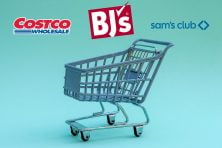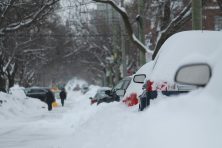8 Recession Indicators and What They Mean for Your Money

Are your roots showing because you can’t justify getting your hair highlighted? Do you have a stack of instant Ramen noodles in your pantry for the first time since college? While Bloomberg might not officially label these as recession indicators, some people on the internet have. The social media world has been having fun with these tongue-in-cheek unofficial recession indicators.
All jokes aside, they reveal a stark reality. Consumers are concerned we might be heading for a recession. But aside from checking our own — plus everyone else’s — buying habits, how will we know? We have some top signs of a recession to help you spot one as it’s happening.
What Is a Recession, Really?
Warnings of a potential recession are everywhere. But so far, we have not officially reached recession stage yet. The National Bureau of Economic Research (NBER) monitors business cycles and uses three criteria to determine if the U.S. is in a recession: depth, diffusion and duration.
But typically, the NBER doesn’t declare a recession until after the fact. That leaves it up to experts to make predictions and warn consumers accordingly.
Recession Indicators Have You Worried? Make Some Extra Cash
Hearing about recession indicators can feel unsettling. If you’re worried about what a recession will do to your finances, making some extra money can help. These are some of our favorite ways to make easy cash.
| Offer | What You Can Earn | What You Have to Do | Take Action |
|---|---|---|---|
| InboxDollars | $225/month | Complete short surveys | |
| FreeCash | $1,000/month | Simple online tasks | |
| GoBranded | Up to $140/month | Share your honest opinion | |
| Solitaire Cash | Up to $83 per win | Compete against other players | |
| Bingo Cash | Up to $83 per win | Compete against other players | |
| Kashkick | $1,000/month | Try out apps |
How Economists Define a Recession
Economists typically define a recession as two consecutive quarters of declining gross domestic product (GDP). But both experts and the NBER pay close attention to recession indicators like falling employment, manufacturing output and consumer spending.
“You cannot just look to one number, but to a sustained, across-the-board slowdown in the economy,” explains Michael Baynes, co-founder and CEO of Clarify Capital. “If, for example, job expansion is decelerating, wages aren’t moving and businesses are cutting back, all of those are signs the economy is in difficulty.”
How It Affects Everyday People
For the average household, a recession isn’t just a historical event. It means layoffs, higher grocery bills and missed mortgage payments. Even if you keep your job, you may find your expenses overtake your income, quickly putting you further in debt.
The Top Recession Indicators You Should Know
While it might not be as fun as tracking Waffle House egg surcharges, there are some valid economic downturn warning signs. Experts look at the following signals when trying to predict a recession.
1. Inverted Yield Curve
It sounds complicated, but this metric is one of the top recession indicators. Simply put, in a normal economy, longer-term bonds pay more than their short-term counterparts. When that flips, which means short-term bonds are paying better, it typically erodes economists’ confidence.
2. Rising Unemployment Rates
Keeping an eye on unemployment rates can also help you see a recession on the horizon. Although unemployment can fluctuate based on a variety of factors, it tends to rise in the months leading up to a recession. It makes sense. When unemployment rises, consumer spending drops and the economy takes a hit.
3. Falling Consumer Confidence
The recession indicators meme signals a bigger issue. Consumer confidence is shaky. That’s a top indicator, and it’s tracked by the Conference Board’s U.S. Consumer Confidence Index. When confidence falls, a decline in spending usually follows.
“A recession creates individuals who are stingier about money, and that stinginess slows down the economy even more,” Baynes adds.
4. Declining GDP
As mentioned above, two straight quarters of declining GDP tends to officially signal a recession. GDP data is posted on the Bureau of Economic Analysis website.
5. Lower Corporate Earnings
Another way to tell if a recession is coming is to look at corporate earnings reports. When large corporations report a decline in profits, it’s a sign customers are pulling back on spending. That also means cutbacks in the business sector, which could mean layoffs and reduced spending.
6. Stock Market Volatility
The stock market isn’t always a reliable economic gauge, but turbulence on Wall Street can be a sign investors are anxious. Because investors tend to forecast ahead, an old axiom states that the stock market leads economic activity by about six months.
7. Tightening Credit Conditions
Banks tend to tighten their lending activity when the economy seems unstable. If consumers are having a tougher time qualifying for loans, lenders are likely responding to concerns about the economy. Credit card and small business loan approvals may also become harder to get.
8. Inflation vs. Deflation Trends
Slow-rising inflation is normal, but when price spikes happen practically overnight, a recession could be the culprit. The Federal Reserve watches the prices of goods as a basis for raising or lowering interest rates.
Are We Heading for a Recession Right Now?
The NBER hasn’t officially declared a recession, but we have seen a few signs. Balancing economic data against expert predictions can give the full picture.
What the Latest Economic Data Says
Although inflation is still somewhat high, it’s been settling around 3% year over year. Consumer spending is still uneven, with some sectors seeing growth and others experiencing a decline, and borrowers report higher credit card rejection rates.
There is some good news in all of this, though. Short-term yields are not currently higher than long-term bond yields, and that’s one of the top predictors of a recession. The unemployment rate is 4.3%, although hiring has slowed. The GDP experienced a drop in the first quarter of 2025, but rebounded in the second quarter.
What Experts and Analysts Are Predicting
While some indicators point to a recession, experts are hesitant to say a recession is near. Many cite a possible “soft landing,” which means we go through an economic slowdown that doesn’t lead to a recession. Baynes said we appear to be on a tightrope, with consumer spending and unemployment holding somewhat steady but consumer debt and moderate job growth pointing to potential issues.
“The Federal Reserve maintaining high interest rates can still push things over into recession,” Baynes said. “If this is the case, it is likely to be shallow but still be experienced by most consumers. But if the economy is just readjusting without taking the sharp plunge, we might be headed for the slow growth option. Either way, it is time to be cautious and look to the future.”
What Happens During a Recession? (Financial Impacts)
Before you seek out recession financial advice, you’ll need to first consider where it will hit you hardest. Recessions generally affect a few key areas.
Job Losses and Layoffs
When funds are tight, employers look for ways to cut costs, and payroll reductions can make a big difference. Industries like hospitality, retail and construction tend to take the hardest hit, but overall, workers in most industries will see eliminated positions and hiring freezes.
Stock Market Losses
Although stock market losses are often linked to recessions, that isn’t always the case. In fact, five of the 11 U.S. recessions saw positive stock market returns. Still, it’s tough to predict exactly how investors and businesses will react to an economic downturn, and that unpredictability can make it tough if your money is at stake.
Rising Debt Defaults
With job losses and rising costs, recessions tend to take a toll on household budgets. Paying even your minimum monthly credit card payment can be tough when your bank accounts are nearing overdraft. But credit cards are only one piece of the debt puzzle. Borrowers may also fall behind on mortgage or rent payments, student loans, car payments and other debts, at which point repossession and foreclosure rates increase.
Housing and Rent Market Effects
When funds are tight, homeowners and renters tend to delay moving. As a result, housing demand cools, and fewer homes go on the market. The good news is rent hikes may slow down during a recession, but consumers hoping to buy a home may find their mortgage applications denied.
Impact on Everyday Costs
Recessions can bring some more good news. The prices you pay for everyday goods may drop. But in some instances, prices may rise. If consumer demand for certain products or services exceeds supply, prices could increase even as consumer spending drops.
What You Can Do to Protect Your Finances
All the recession talk can be stressful. However, it helps to take measures to prepare. Here are some things you can do to keep your finances safe during a recession.
Build an Emergency Fund
If you have even a few extra dollars in your budget, move them into a high-yield savings account to start earning interest on that money. You can even set up your bank account to automatically funnel a portion of your paycheck toward your savings. Baynes recommends working toward an emergency fund to cover at least three months of living costs, but even a couple hundred bucks can help in a pinch.
Pay Down High-Interest Debt
As you’re strategizing how to prepare for a recession, inventory all your bills, paying close attention to interest rates. While some experts recommend the debt snowball method — which involves paying off smaller debts first, then rolling your minimum payments into the next-highest debt — when a recession is possible, the debt avalanche method might be a better option. With a debt avalanche, you pay off the debts with the highest interest rates first.
Recession-Proof Your Resume or Skill Set
Certain industries see less of an impact during a recession. Health care and education, for instance, tend to make lists of recession-proof industries. If you’re in a sector that faces layoffs and cutbacks during economic slowdowns, you may want to look into certifications or affordable online courses that can prepare you to make a career pivot if necessary.
Reassess Investments and Risk
High-risk investments aren’t for everyone. Certain investments, like Certificates of Deposit (CDs), money markets and municipal bonds can help you sleep a little better at night. But with high risk can come big rewards, so it makes sense to continue to take chances. If you do, Baynes has some advice for weathering the storm.
“If you have investments, stand firm in your long-term plan rather than be reactive to things happening in the market over the short term,” Baynes advises.
Make a Leaner Budget
If you’re looking for tips on what to do before a recession, one of the best steps you can take is to create a budget. Once it’s in place, scour it for ways to cut costs. Pay particular attention to non-essential spending, like dining out and traveling. You can also review all subscriptions and streaming services to look for areas to eliminate.
“The newest social media meme making jokes about ‘real recession indicators’ such as cutting streaming services or skipping haircuts is funny, but revealing,” Baynes said. “Those small tweaks are symptomatic of something larger about consumer confidence and spending.”
Avoid Big Purchases or Risky Moves
A recession may not be the best time to buy a new car or start a house-flipping business, but keep in mind economic slowdowns are only temporary. The key is to hunker down and wait for it to pass rather than desperately trying to fix it. During economic tough times, you’ll want to be cautious when it comes to long-term financial commitments, including buying new cars or homes.
Smart Financial Moves During a Recession
Yes, it can be tough to know how to protect your money in a recession. But once it’s underway, you’ll need to know what to do to minimize the damage. Here are some smart financial moves to make during any economic downturn.
Where to Park Your Savings
If you have most of your money in an FDIC-insured savings or money market account, it should weather a recession just fine. But traditional lenders aren’t exactly generous with the interest they pay. Consider shopping around for a bank, online or traditional, that offers high-yield savings and money market accounts. Other low-risk, high-yield options include Treasury Bills, U.S. Treasury Bonds and dividend stocks.
How to Shop Smart in a Downturn
Your favorite penny-pinching relative can likely give you a list of helpful tips for surviving a recession. But you don’t have to be a spendthrift to reduce your shopping budget. In fact, if you’re willing to put in a little extra time, you can make a few small changes that add up in big ways.
- Coupon and cashback apps: Clipping coupons is nothing new, but today’s consumer is more likely to rely on one of the many cost-cutting apps on the market than to cut them out of the Sunday newspaper. You can even install browser extensions like Capital One Shopping that will identify savings opportunities while you’re shopping online.
- Buy in bulk: As recession talk heats up, consider stockpiling canned goods, paper products and cleaning essentials. If you have a discount wholesale shop like Costco, BJ’s or Sam’s nearby, the membership may be well worth the money.
- Shop secondhand: Thrift stores and other places that sell “gently loved” clothing can keep you fashionable without draining your bank account. You can also shop secondhand online on platforms like ThredUp and Poshmark.
Side Hustles That Hold Up in a Recession
If your full-time job isn’t cutting it, a side hustle could provide some much-needed relief. You don’t have to start applying for part-time jobs with inflexible hours. Instead, look into options that let you set your own hours. Here are some ideas.
- Bingo Cash and Solitaire Cash are games that pay real money directly to a bank account, often as early as the next day, but timelines can vary.
- Freelance creative work: If you can write, edit or design, sites like Fiverr and Upwork can get you started. You can put together a portfolio and make connections on LinkedIn that will lead to ongoing work.
- Online tutoring or teaching: Remote learning never returned to pre-pandemic levels. Today, plenty of students and adult learners are looking for online and hybrid education opportunities. You can sign up to tutor or teach online classes, or create assessments or lesson plans for learning platforms.
Final Thoughts: You Can’t Predict the Future, But You Can Prepare
Memes about recession indicators may be fun, but they don’t cover the more serious signs of a recession. While you can’t control the economy, you can control how you’ll fare during tough times by creating a budget and putting an emergency fund in place. If your recession indicator is passing up that seven-dollar latte, though, know that you aren’t alone. Just make sure that as you’re sharing memes, you’re also recession-proofing your finances.
Stephanie Faris is a professional finance writer with more than a decade of experience. Her work has been featured on a variety of top finance sites, including Money Under 30, GoBankingRates, Retirable, Sapling and Sifter.












